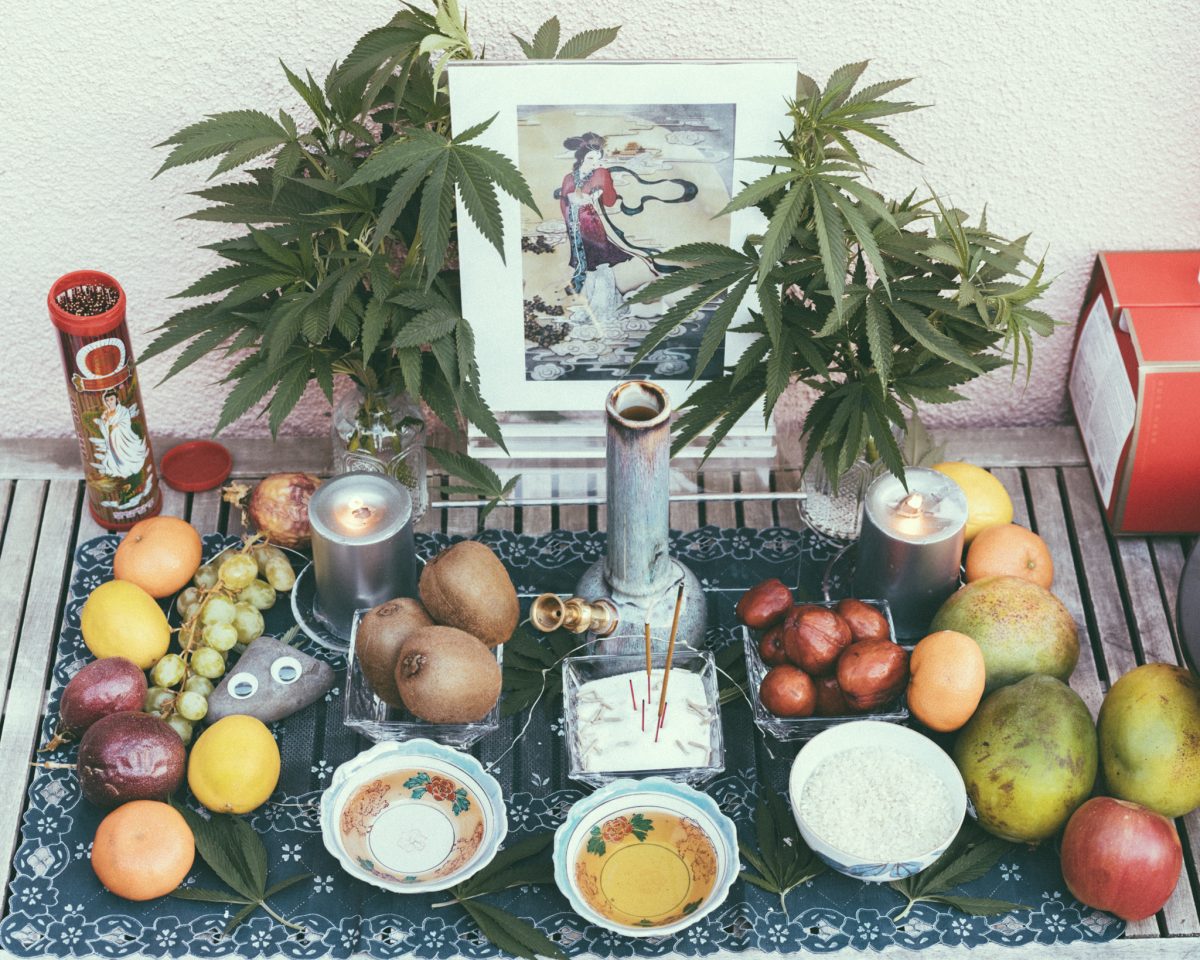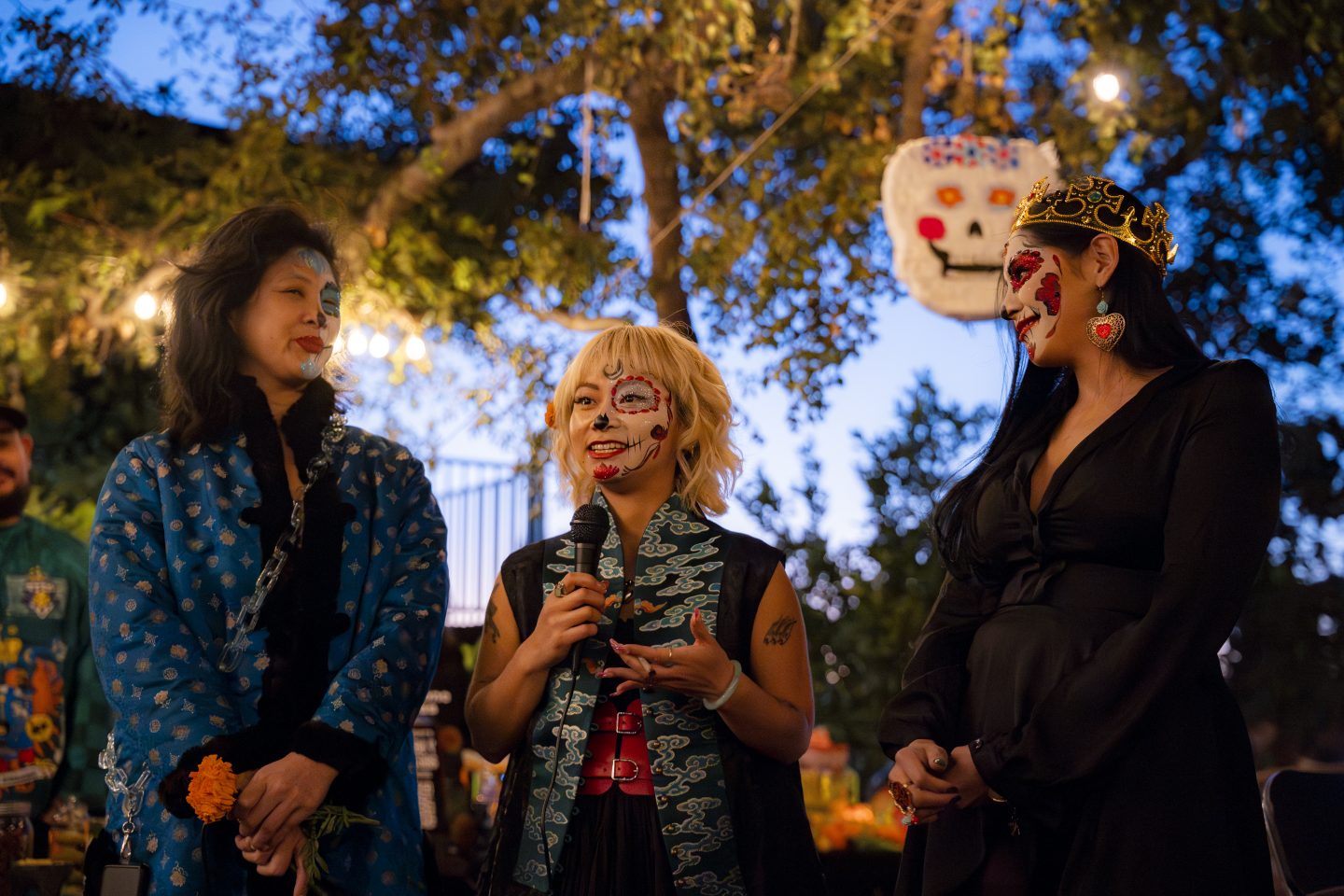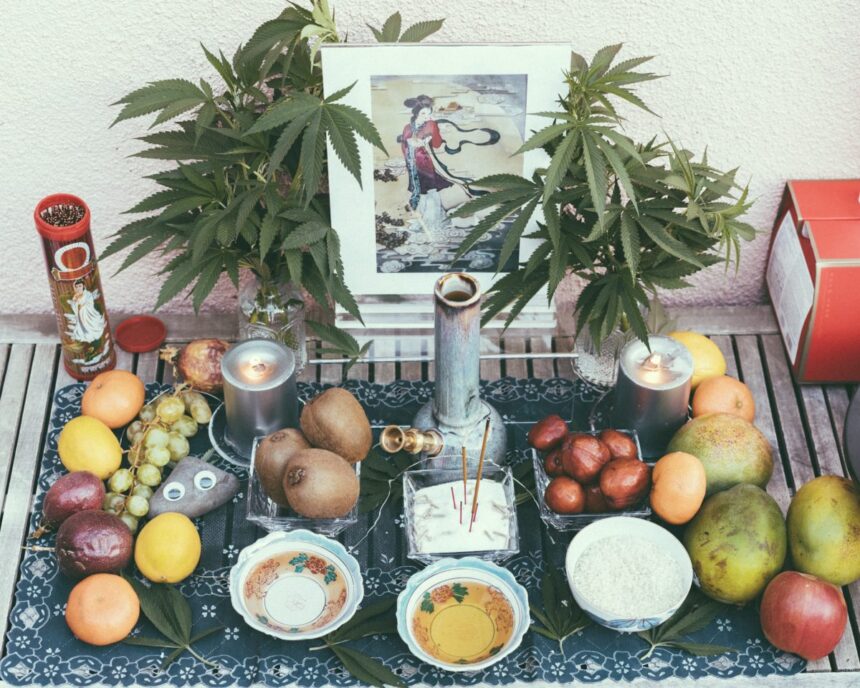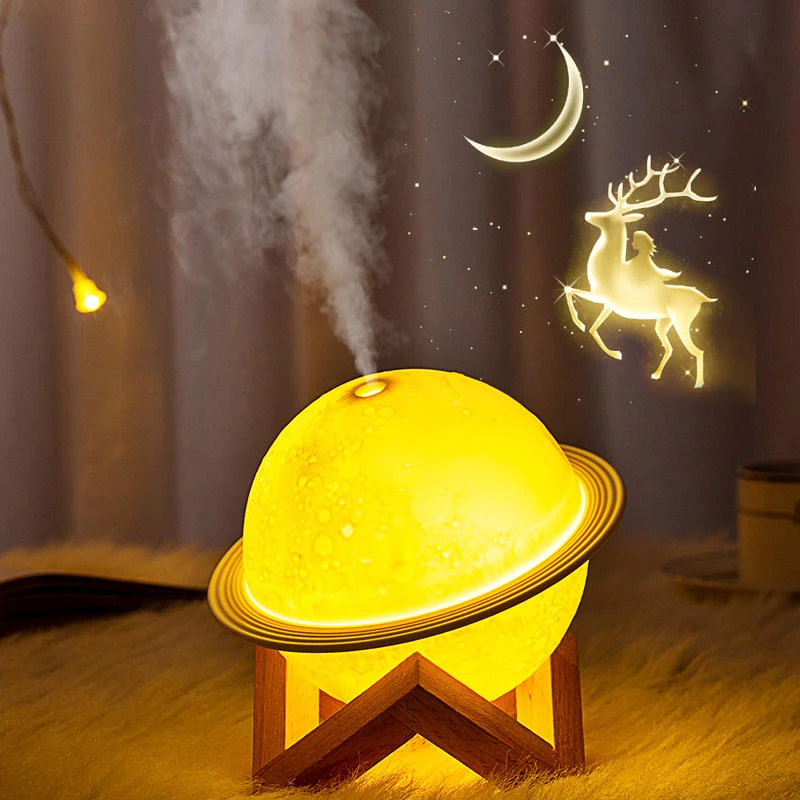Witness them together, and it’s immediately clear: Wendy Zeng and Christina Wong have a special bond.
They cozily share Zeng’s living room couch as we start our virtual interview, their answers weaving together effortlessly with every question. It’s impossible to deny the pair’s electric chemistry, even though they only met in 2021.
By 2022, they held their first event for Mogu Magu: a culture and cannabis collective for folks who “occupy the in-between,” immigrants, and those who know that feeling when you don’t quite fit in.
Mogu Magu: A Collective is Born
Zeng and Wong connected over these experiences when they first met, initially bonding online over weed and food before realizing they lived in adjacent LA neighborhoods and meeting up in person.

Both forged their own professional paths within the cannabis industry, largely centering food as an avenue of accessibility for those who may otherwise be intimidated by the broader community conversations. In those beginning stages of their friendship, they relished their instant bond as two Asian American women establishing themselves as professionals and within the SoCal cannabis community.
“Cannabis has this beautiful way of opening yourself up,” Wong said, expressing her gratitude in “having a friend who understands each other’s culture (a bit different, but also same, same) and this magical power of cannabis with it.”
The Los Angeles cannabis scene is immense, but it often lacked events where Zeng and Wong felt truly comfortable. Many people go to cannabis gatherings with the goal to destigmatize, but Zeng challenged how effective this intention truly is with events that limit the scope to a singular, dominant culture.
“How do we keep progressing these narratives and shining a light on these intersectionalities of all these diverse cultures, backgrounds, and lifestyles?” Zeng posed.
Thus, they sought a place for more expansive conversations, to explore the unique experience of AAPI cannabis lovers and reclaim the narrative of cannabis as a means of generational healing.
This experience simply didn’t exist, so Zeng and Wong created it themselves with Mogu Magu.
Embodying Magu and Embracing Growth
The name was inspired by Magu, a hemp goddess symbolizing longevity and immortality, represented in art and ancient texts across a variety of Asian countries. Magu represents the collective’s contemporary exploration of cannabis in AAPI communities, a means of opening conversations and spreading awareness of the ever-present cultural stigmas on cannabis.
While Mogu Magu events typically focus on cannabis, food, and a specific culture, the plant’s ability to heal the body, mind, and spirit is the driving force.
“The first, inaugural events were very much this friends, cookout vibe: friends who just happened to also work in cannabis,” Zeng said. “Mogu Magu at its core started as a model of our friendship, how we were healing ourselves through weed, food, conversations, and connection.”
After getting it off the ground, they immediately explored how to push Mogu Magu further. Some of the first events celebrated Chinese holidays like the Lunar New Year and the Mid-Autumn Moon Festival, but the AAPI diaspora includes many more. This sparked curiosity and ultimately elevated the collective to new heights.
Wong recalled their line of thinking at the time: “Well, I know a lot about the other A’s and the P’s and the I’s. I would like to learn about these holidays and celebrate them. That led us to inviting our friends to co-host with us, to be able to teach us a little something, bring in cannabis… we got to learn so much.”

The pair began reminiscing over the initial events that reflected Mogu Magu’s expanding scope: They named Diwali and Dabs, a 2023 event celebrating the Hindu festival of lights and hash culture in Southeast Asia featuring henna, foods like naan and panipuri, and even bhang, an edible preparation made with cannabis leaves with a medicinal history in ancient India.
The 2024 Pinay Par-TAY maintained a focus on Filipino culture, with a scratch-made halo-halo bar, a garden concert, desserts from local cannabis-infused Filipino baker Babinka Treats, adobo bowls whipped up by Zeng, Wesley Chiang’s pabitin (or Filipino piñata) building expertise, and more.
Just after Halloween, Mogu Magu embraced Día de los Muertos as a pivotal moment for the collective’s evolution. It opened a new intersectional path, highlighting the common struggles, solidarity, and shared advocacy of Asian and Latina allyship throughout U.S. history.
“It went from our friendship and our culture into leaning into intersectionality, because it wasn’t just the Asian culture: it was about the immigrant diaspora,” Wong said. “We all move; we’re all here in America; we have access to cannabis and the emotions, the feelings. There are a lot of similarities. A lot of people, we exist in the in-between.”
An Intersectional Evolution
Allowing the collective to transcend their own personal experiences echoes the ethos that birthed Mogu Magu in the first place. It creates space for those in the cannabis community who otherwise may not have one. In many ways, they see this new direction as more timely and important than ever.
Americans across the country are feeling the weight of Trump’s policies this year. Our conversation took place in August 2025, toward the end of a brutal Los Angeles summer that started with a sudden, heavy ICE presence throughout the city. Immigrant communities were relentlessly targeted, creating a palpable and ever-present tension among Angelenos forced to accept it as a new reality of their everyday lives.
The escalation of COVID-19 and the quarantine that followed also marked a recent turning point for our nation, with the AAPI community grappling with an influx of hate crimes. Zeng referenced a phrase that gained traction back in 2020: “Stop Asian Hate” first gained traction to counteract pandemic racism and violence. She argued it’s ultimately “unhelpful” and creates a separation to promote Asian exceptionalism.
While these topics from the past and present are distinct, they’re part of the same conversation.
The collective strife modern Americans experience is often met with our leaders shifting the focus toward our neighbors and community members. All the while, we’re divided and distracted without further insight on affordable healthcare and housing, the progressing climate crisis, income inequality, and a slew of other issues keeping us from the “life, liberty, and pursuit of happiness” we were promised.
“All of the issues are related, and the more we can spot a light on the connection, then we can be more organized in how we change the world we live in and make it better,” Zeng said.
The pandemic showed Zeng, Wong, and so many people just how important community and chosen family can be. Especially in places like Los Angeles, where the diversity and rich collection of identities feel intrinsically linked to the magic of this city, current events act as another solemn reminder of why we need each other today.
Wong recalled a Mogu Magu event from earlier this summer, held on June 8. The first immigration raids in Los Angeles took place just two days before, quickly sparking protests and prompting Trump to deploy thousands of National Guard members to the city within the coming days.
“We had so many people who said, ‘Thank you. I just needed somewhere to get my mind off this, make art, and do something.’ The years before, it was always these kinds of big cultural celebrations,” Wong said. “This year, it shifted to fit what we felt our community really needed. We started doing more workshops, hands-on things. How do you forage for food? How do you make things, grow things? That’s been really rewarding.”
Today, the collective expands far beyond the mythical figure it was named for, but the inspiration is stronger than ever. The Magu community is immense, made up of activists, organizers, and creatives offering their own unique approaches to the overall mission.
“There are so many people helping their community in their own way, with their creative expression of it, and that’s so beautiful for us to be a part of, witness, and help facilitate,” Zeng said.
Zeng and Wong recently ventured beyond the City of Angels, approaching the same conversations in new settings to unleash a new collection of narratives and experiences. Last summer, they set off on a 10-day road trip to a number of sungrown cannabis farms in Northern California.
Of course, these two didn’t stop there, as their journey eventually morphed into a four-part travel docuseries titled In Search of Magu.
As you’d rightfully assume, this love letter to California weed country comes with plenty of food and cannabis. What really drives the docuseries are the stories, intimately examining various craft farmers and their distinct creative expression, shaped by the unique regions surrounding them.
“It’s just so cool to see the diversity across sun-grown cannabis in Northern California like that,” Zeng said. “So many people don’t know that. The average consumer walking into a dispensary is not thinking about that, this vibey fantasy land of weed country, and that actually hurts the sustainability of that scene.”
Zeng and Wong are currently in the editing process and aim for a screening in the coming year, but they aren’t putting themselves on a strict timeline to share it.
When it comes to the road ahead, they reference Mogu Magu as a universe, a canvas for their entire collective to use and create with. As Wong said, “So many people ask us, ‘Oh, when are you coming to this city?’ and I’m like, ‘You could do it,’ you know? ‘How do we help you?’”
While Mogu Magu eats up plenty of their time, Zeng and Wong don’t depend on it to make money. Like so much of the Mogu Magu journey so far, the flexibility and fluidity of their approach is what allows it to continue flourishing.
“We talk about this being altruistic and stuff, but honestly, selfishly, we follow our creative drive and interests in doing these things,” Zeng said. “That’s why we haven’t burned out, and we are even more excited to see where this takes us and how we can grow, because it always comes down to what we want to do. What is the thing that’s creatively tugging at our hearts? Keeping that intention is so important.”
Photos courtesy of Mogu Magu.




























